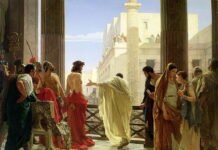A few years ago, I was told a fascinating literary variation on the story of Adam and Eve. This version has many of the story’s usual features: it tells of how God places Adam and Eve in a garden of bliss with only one thing forbidden to them, the fruit of the tree of the knowledge of good and evil; it tells of how the first couple eat of the fruit and in their disobedience are expelled from Eden. However, there is a twist: it suggests that Eve is the mother not only of the human race but also of metaphor.
You see, in the days of their bliss, Adam takes on a role reserved to himself alone: to name all the animals and birds and living things. He even names his companion woman. Whatever word he uses, for whatever creature, that word sticks. It is their name. It is what they are.
However, according to the literary variation I was told, when Eve sees the delicious-looking forbidden fruit at the heart of the forest and takes it, her action brings something new into the world: the power to speak of that which is in terms of that which it is not. Until the fruit was eaten, when Adam saw a thing and named it, it could only be spoken of by that one word. It had only one meaning; it was literal truth. As Eve takes hold of the forbidden fruit, the power to speak figuratively is born. Words are no longer simply names but can now mean many things. No longer does a flower simply have to be a flower or eyes merely eyes. A flower can become a feast for the eyes; eyes can be diamonds or stars.
Metaphor is born. That’s how the story goes. In Eve’s act of disobedience, something new is birthed: literature and poetry, storytelling and the power of fiction to create worlds.
Well, whatever else we might think of the story, it certainly offers a different picture of the origin and nature of sin. Rather than Eve being seen as ground zero for all the pain and lies in this world or as the prototype “weaker vessel” whose role is to birth children, she becomes the mother of our human genius for storytelling and poetry. According to this version of the origin myth of humanity and of fallen-ness, Eve’s boldness is not to be coded as merely negative, because it opens up the world of fiction to us.
Such a reading might help us understand the suspicion some hold toward poetry and literature, toward the humanities in general. Plato may have been the first to criticize poetry’s power to lead into deception and falsehood, but he is not the last to question how words and images may be used to trick and deceive. This literary version of Adam and Eve even tempts me to imagine I’ve found an origin myth for the toxic culture wars about truth and falsehood that are currently being stoked in both the United States and the United Kingdom. As a poet and writer, I want only to acknowledge the wondrous power and slipperiness of words. They can create both hopeful and terrifying worlds and visions; they can be used to soothe and invite as much as trick and manipulate.
Read it all in The Christian Century



